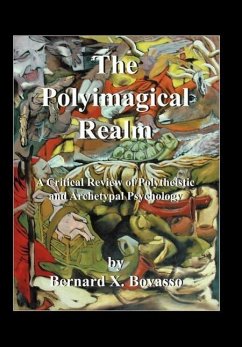The Polyimagical Realm I must note that as primarily a painter at the time of composing this work (1986) I was also painting "angels." They were in figure what I have called personatypes and simulated, imitated realities, yet arché and beyond typification (typos) in content. This ambiguity is in fact the subject of this book. The simultaneity of image and immanence is not a problem, except we have no credible concept for simultaneity, or complementarity, and by which ambivalence prevails as the earmark of reality. Now, in the year 2004 it is the least I can say for showing the differences that only analytically repose in mutually exclusive camps, that of C.G. Jung's rigorous and extensive amplification of Freud's Psychoanalytic and the new Post Modern wave of James Hillman's Archetypal Psychology and its polytheistic trimmings. In that case the many gods earn a capital "G" and in contention with the One God. But speaking as both a painter and a poet I can only fall back on an experiential standpoint, something reminded by Plato 2500 years ago in his Ion dialogue: "and therefore God takes away the minds of poets, and uses them as his ministers, as he also uses diviners and holy prophets, in order that we who hear them may know that they speak not of themselves who utter these priceless words in a state of unconsciousness, but that God is the speaker, and that through them he is conversing with us." Bernard X. Bovasso Spring, 2005
Hinweis: Dieser Artikel kann nur an eine deutsche Lieferadresse ausgeliefert werden.
Hinweis: Dieser Artikel kann nur an eine deutsche Lieferadresse ausgeliefert werden.








